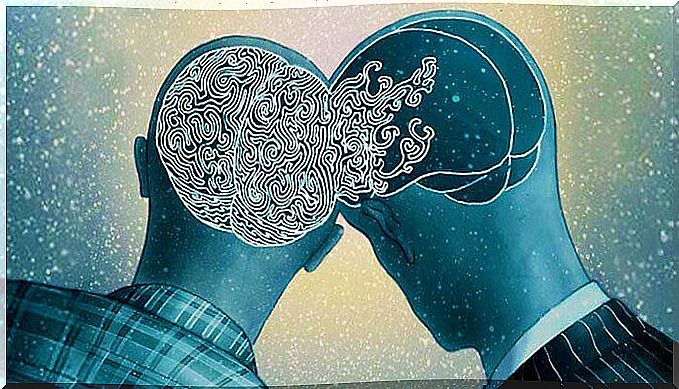The Over-empathy Or Compassion Fatigue Syndrome

A person with excess empathy is like a long-range antenna that absorbs and engulfs every vibrating emotion around them. Far from dealing with such an overload, she ends up diluting herself in the needs of others, poisoning herself with excessive compassion to the point of feeling guilty for the suffering that others experience. Little suffering can be so exhausting.
It is possible that seeing this type of situation as a clinical problem may surprise more than one. Are we not exaggerating by labeling “pathological” behaviors (apparently) “normal”? Obviously no, and there is an explanation. If the Diagnostic and Statistical Manual of Mental Disorders (DSM-V) itself labels it as a feature of personality disorders, it is for an obvious reason.
Any behavior that hinders our way of communicating, that causes us suffering and the inability to lead a normal life, requires a diagnosis and some type of therapeutic strategy capable of resolving the situation. Therefore, people who suffer from an excess of empathy or “hyper-empathy” and who manifest a persistent pattern of unhappiness and an inability to function at the social, personal and professional level, would enter, in this case , in a personality disorder.
All this undoubtedly leads us to realize that it is not the same thing to “be very sensitive” and to suffer from a syndrome of “hyper-empathy”. For example, in the interesting work of Sandra L. Brown entitled “Women Who Love Psychopaths”, we find something that cannot leave anyone indifferent. The work of the psychiatrist, we can see that there are of s women who fail to understand the psychopathic behavior of their spouse and even justify it.
Their excess of empathy completely prevented them from seeing the predator, murderer or aggressor they had in front of them. In addition, their ability to justify the violent acts of their spouse was highly sophisticated. A fact that makes it clear that over-empathy is a type of disorder that we don’t talk about much but should take into consideration.

Empathy and excess of empathy, frontier of balance and well-being
Maybe some of you will think that if empathy is a positive, useful, and desirable ability… why wouldn’t it be okay to present “a lot of empathy”? As always, in life, excess is not good, the ideal is balance. The same thing happens with this dimension where we fail to discriminate the “self” as well as the “me” of others. In other words, that with the famous sentence according to which “ empathy is the capacity to put oneself in the place of the person who is in front of us”, we should specify that we will do it but without ever ceasing to be us. themselves.
On the other hand, it is important to remember what types of empathy we can experience, which are healthy and which can lead us to that frontier where, inevitably, discomfort arises.
- Affective empathy or “I feel what you feel”. In this case, affective empathy is related to our ability to sense the emotions, sensations and feelings experienced by another person… and also to have compassion for them.
- Cognitive empathy or “I understand what’s happening to you”. Cognitive empathy is more of a skill. It allows us to have a more complete and precise knowledge of the content of the mind of the person in front of us. We know how she feels and we understand her.
- Too much empathy or “hyper-empathy” supposes being a mirror and at the same time a sponge. We not only feel what others feel, but we suffer it, and it is a physical pain that generates anxiety and which, moreover, subordinates us to the needs of others without being able to discriminate this border. between oneself and others.

What characterizes the person with over-empathy or “hyper-empathy”?
Describing a person with hyper-empathy or over-empathy syndrome will help us on different levels. First of all to distinguish between simple “emotional sensitivity” from pathological “hypersensitivity”. In addition, we will see how the DSM-V identifies this type of behavior.
- Obvious deterioration of one’s own identity as well as social skills.
- It is common for other types of disorders to appear, which are marked by obsessions or psychotic behavior.
- It is common for the person to experience many mood swings, ranging from the most profound depression to theatrical or excessive joy.
- These are very dependent patients. In other words, these people want to solve all the problems of others in order to reinforce the image of useful and necessary people that they wish to project, they need continuous interaction and they accept themselves by granting favors see by promoting them themselves. They feel bad, rejected and unhappy if someone tries to put limits on them.
- It is also common for people with “hyper-empathy” to be extremely overprotective and undermine the autonomy of others.
- The excess of empathy makes them experience serious difficulties when it comes to being productive at work. They feel discriminated against, think that no one understands their altruism, their need to support others, to help …
- Finally, we often encounter patients who move from over-empathy to resentment. They went through so much disappointment that they ended up isolating themselves, submerged in their feelings of anger and disappointment.

What if we suffer from excess empathy?
At this point, many of us are likely to wonder why. What causes a person to experience so much pain in contact with the emotions of others? We have seen a lot of progress in recent years in this area, so that we now know the genetic and neurochemical bases that can favor this situation.
What we call “empathy spectrum disorders” give us a lot of information about realities such as Asperger’s syndrome, “hyper-empathy” syndrome or borderline personality disorder. This is undoubtedly an interesting subject that will bring us great answers and allow us to implement better therapeutic approaches in the years to come.
On the other hand, when asked what we should do if we suffer from overempathy, the answer couldn’t be simpler: seek professional help. Whether we are in the most extreme case of this pathology or simply suffer from “hypersensitivity”, it is always oppportunity to learn a series of appropriate techniques in order to set limits, to have better control of our thoughts, fuel our own needs, and more forcefully define our own identity and self-esteem.
We cannot forget that an excess of empathy not only generates unease, but also separates us from ourselves and from the world itself. It is not worth getting bogged down in such a sphere of lingering voids and torment . Let’s take the step …









